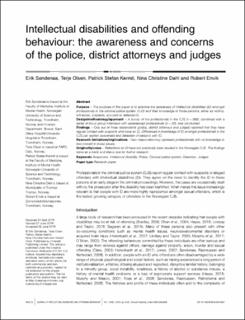Intellectual disabilities and offending behaviour: the awareness and concerns of the police, district attorneys and judges
Peer reviewed, Journal article
Published version
Permanent lenke
https://hdl.handle.net/11250/2779218Utgivelsesdato
2019-08-08Metadata
Vis full innførselSamlinger
Originalversjon
https://doi.org/10.1108/JIDOB-04-2019-0007Sammendrag
Purpose – The purpose of this paper is to examine the awareness of intellectual disabilities (ID) amongst professionals in the criminal justice system (CJS) and their knowledge of those persons, either as victims, witnesses, suspects, accused or defendants. Design/methodology/approach – A survey of the professionals in the CJS (n ¼ 388), combined with a series of focus group interviews with experienced professionals (n ¼ 20), was conducted. Findings – One out of three respondents (police, district attorneys and judges) reported that they have regular contact with suspects who have an ID. Differences in knowledge of ID amongst professionals in the CJS can explain awareness and detection of persons with ID. Research limitations/implications – Non-responders may represent professionals with no knowledge or less interest in these issues. Originality/value – Reflections on ID have not previously been studied in the Norwegian CJS. The findings serve as a basis and status quo for further research.

